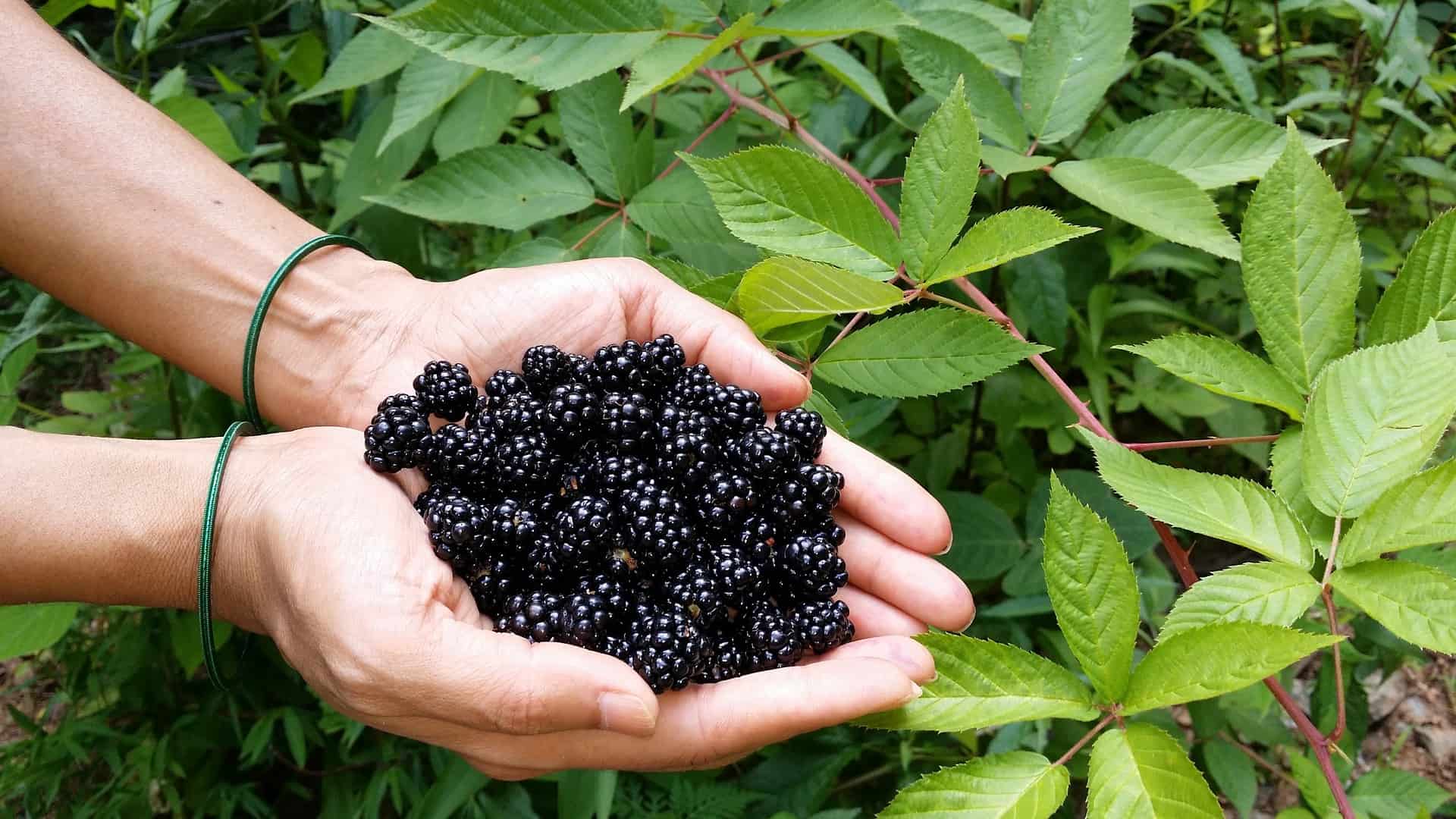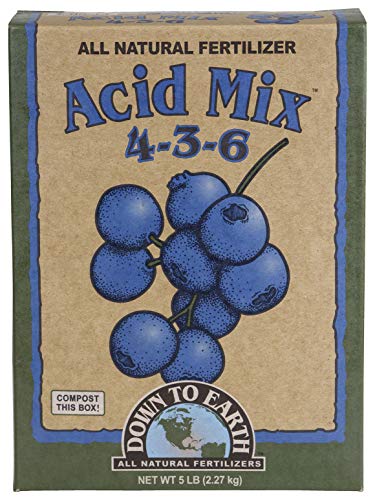Blackberry bushes need regular fertilizing to produce high yields every year without losing quality. On this page, you’ll find the best fertilizer for blackberries that will help your plants reach their full potential and produce an abundant harvest.
Best Fertilizer for Blackberries
Best Fertilizer for Blackberries
Espoma Berry-Tone Plant Food, Natural & Organic Fertilizer for All Berries
Espoma Berry-Tone Plant Food (Buy Online) makes fertilizing your berries easier than ever before. This natural fertilizer is made from 100% organic ingredients, so you don’t have to worry about harmful chemicals getting into the fresh fruit you serve your family
Berry-tone plant food is also made from natural ingredients that are good for your plants and soil. And it features a slow-release formula that feeds your plants over a long period without burning their roots.
This blackberry fertilizer also contains Bio-tone microbes, which help increase growth rates by improving nutrient absorption and root development.
These Bio-tone microbes will also help to break down the organic material in your garden bed. This will increase soil fertility while adding much needed organic matter back into the soil
Berry-Tone will also feed your plants with essential nutrients including Nitrogen, Phosphorus, Potassium, Calcium, and Magnesium just when they need it most.
Espoma Berry-Tone Plant Food is ideal for all berries – Blackberries, Blueberries, Raspberries, and Strawberries. Plus you can use it on any edible berries you grow in containers or even in raised beds.
Overall, when you use Espoma Berry-Tone Plant Food it will help your blackberries grow larger and produce more fruit than a standard general-purpose fertilizer.
Jack’s 25-9-17 Berry Special
Jack’s Berry Special Fertilizer (Buy Online) is the best fertilizer for blackberries because it contains all of the major, secondary, and trace elements needed by berry plants.
Jack’s Berry Special fertilizer has a 25-9-17 NPK ratio which will help your plants grow faster than ever before.
This fertilizer also contains the right amount of magnesium, sulfur, and trace elements that will stimulate abundant blooming in your blackberry plants while also helping with fruit production
Plus, this fertilizer is highly soluble so it won’t take long to dissolve in water, so you can quickly mix up a batch of fertilizer for your blackberries.
Jack’s Berry Special is an acidic formulation designed for alkaline soils and may be used on all berry crops including blackberry, raspberry, strawberry, and cranberry crops.
This large 25-pound bag of fertilizer is also very affordable, and you can have it quickly shipped for free right to your front door.
Botanicare SWEET BERRY Mineral Supplement
Botanicare’s Sweet Berry Fertilizer (Buy Online) provides all of the essential nutrients necessary for optimal growth at each stage of a blackberry plant’s life cycle. This concentrated liquid fertilizer is packed with phosphorus, potassium, magnesium, and sulfur as well as micronutrients like iron, zinc, and copper.
Botanicare Sweet Berry has also been specially formulated with organic carbohydrates that encourage berry production while also providing an array of secondary elements needed by fruit-bearing plants during their fruiting stages like iron and zinc which help maintain optimal growth and fruit development.
This makes Botanicare SWEET BERRY Mineral Supplement ideal for blackberry cultivation at any stage from transplanting through harvest.
True Organic – Berry & Fruit Plant Food
True Organic Berry & Fruit Plant Food (Buy Online) has been specially formulated with everything your plants need in one bag. Plus this organic fertilizer breaks down slowly, so you don’t have to worry about over-feeding or under-fertilizing your plants.
True Organic Berry & Fruit Plant Food has a 5-4-4 NPK ratio, which is the perfect balance of Nitrogen, Phosphorus, and Potassium for blackberry plants.
True Organic Berry & Fruit Plant Food contains an additional 6% calcium and 1% sulfur which will help improve fruit size and development.
Plus, this fertilizer is made from a blend of proven organic ingredients including poultry manure, fishbone meal, potash, soybean meal, seabird guano, shrimp meal, seaweed extract, kelp extract, alfalfa leaf extract, feather meal, and limestone rock phosphate.
EcoScraps for Organic Gardening Berry Plant Food
Ecoscraps (Buy Online) contains a blend of organic ingredients that provides all the nutrients you need to grow healthy berries. Best of all, this fertilizer will help you get bigger yields without using harmful chemicals in your garden.
Ecoscraps contains recycled leftovers from all parts of the waste life cycle including material that would usually end up in a landfill. This means you get an eco-friendly fertilizer that is free from potentially harmful substances such as animal manure or synthetic fertilizers.
Down to Earth All Natural Acid Mix Fertilizer 4-3-6, 5 lb
Down to Earth All Natural Acid Mix Fertilizer (Buy Online) is great for acid-loving plants like blackberries because it’s specially formulated with extra sulfur to help lower the pH of your soil.
If your blackberry bushes are growing but the leaves look yellow. And you’re worried that your plants aren’t getting enough nutrients and will die. The pH of the soil might be too high, so you need to add a fertilizer that will lower the pH levels in your soil.
While most fertilizers have a neutral pH, this one has been specifically formulated for plants that need to grow in low pH soil. That’s why we recommend Down To Earth’s All Natural Acid Mix Fertilizer for people with alkaline soil because it contains all-natural ingredients that will gently reduce the pH of your soil without harming your plants.
MicroLife Acidifier (6-2-4) Professional Grade Granular Organic Fertilizer
MicroLife Acidifier (Buy Online) Professional Grade Granular Organic Fertilizer contains 14 % sulfur, 2% iron, humates, and over 100 + minerals, vitamins, natural plant hormones, and essential sugars plus billions of beneficial microorganisms that will bring out the true health and beauty of all acid-loving plants.
This fertilizer also features a slow-release formula which means it won’t burn your plants even if you have a heavy hand. Overall, this is a good fertilizer that will help establish a healthy root system & foliage while encouraging lots of blooms and a heavy fruit set.
Blackberry Fertilizer Requirements
Like any plant or flower, blackberry plants need all the essential macronutrients. In addition, they also require micronutrients to reach their full potential.
The best fertilizer for blackberries is one that includes all of these macronutrients and micronutrients. For example, a 10-10-10 fertilizer would work well with additional micronutrient additives such as iron (Fe), Magnesium (Mg), if your soil lacks those nutrients naturally.
Blackberry Soil pH
Blackberry plants do better in slightly acidic soil conditions. Soil pH for blackberry plants should be within a range of 5.5 to 6.5, but they can also grow well in places where the pH is moderately more alkaline or acidic.
How To Fertilize Blackberries
Blackberries are a delicious fruit with plenty of health benefits. They can be eaten raw, used in recipes such as pies, or simply enjoyed on their own. However, to consistently get bowls full of sweet juicy berries these plants require regular fertilization.
When To Fertilize Blackberries
The best time to fertilize blackberries is in the early spring and late spring. Why not in the fall? Fertilizing too late will increase the risk of your plants suffering from frost damage
How Much Fertilizer To Use on Blackberries
It is recommended to fertilize blackberries in the early spring and once again in late spring at a rate of 1-2 pounds for every 10 row feet. If the ground in your area is very sandy or acidic, it may be advisable to use less fertilizer to avoid burning your blackberry plants.
How Often To Fertilize Blackberries
You should fertilize blackberries twice per year, once in the early spring and then again around forty to sixty days after the first application of fertilizer.
Blackberry Plant Problems
Blackberry Leaves Turning Yellow
Blackberry leaves turning yellow point to lack of iron/nitrogen or too much moisture. If the color change is not a sudden one but rather gradual, there is likely an ongoing problem that should be addressed quickly with additional fertilizer for the health of the plant.
Rapid yellowing of plant leaves can also be linked to a fungal infection by the fungus, Verticillium Dahliae. This fungus thrives in damp conditions and can damage a plant’s foliage when the leaves get wet, or if you haven’t provided sufficient airflow around your blackberry plants.
Blackberry Leaves Turning Brown
There are a number of possible reasons why leaves would turn brown on a blackberry plant, but if the problem is new, the first thing to do is water the plant. Then check for signs of excess potassium in the soil, fungus, or pests like aphids and scale insects sucking on it.
If this doesn’t work then try fertilizing with iron sulfate. This will help correct any deficiencies and reduce leaf death due to a lack of sufficient chlorophyll production
Blackberry Leaves Curling
Leaf curl virus is a devastating disease, and aphids have been found to carry this plant pathogen. The virus replicates and then spreads throughout the plant within days, killing young leaves and causing older leaves to change shape as they curl up.
Read More: What Eats Aphids
Black Spots on Blackberry Leaves
Leaf spot fungus is quite common in blackberry plants and occasionally appears as small black spots that quickly cover a leaf.
An additional cause of black spots on leaves could be potassium deficiency due to a lack of this nutrient in your soil.
Why Are My Blackberry Leaves Falling Off
Blackberry leaves may be falling off for a number of reasons. One of the most common causes is lack of moisture. Lack of water will typically lead to wilting and eventually leaf fall, particularly during prolonged dry periods, or if there is too much competition from surrounding plants.
Fungal infections such as powdery mildew may also cause leaf fall; often developing after periods of high humidity. Additionally, leaf fall can also be caused by plant diseases such as bacterial leaf spot
Blackberry Leaves Turning Red
Blackberry leaves turning red is usually a sign of two different problems. The first reason is fungal rust on the leaves that causes them to turn red coinciding with a powdery substance appearing on the underside of the leaves.
The other common reason blackberry bushes turn red is due to a temperature change which causes them to produce more anthocyanins as a form of cellular protection.












